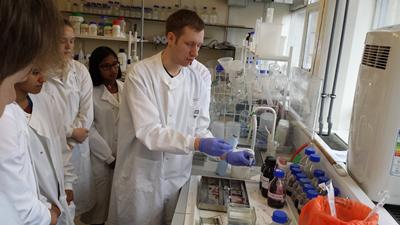Biomedical Engineering course for 15 and 16 year old students held at the University

Notes for editors
From Monday 27 to Thursday 30 July, the University hosted a residential programme for 15 and 16 year old students to provide an understanding about the world of biomedical engineering.
Students took part in a series of masterclasses and laboratory demonstrations covering topics including keyhole surgery simulations, measuring and delivering signals from the body for monitoring health and restoring activity and taking part in stem cell masterclasses. They also attended laboratory demonstrations organised by teams from the Bioengineering Sciences research group, Health Sciences, and the Centre for Human Development, Stem Cells and Regeneration, which included motion analysis, ultrasound imaging and tissue engineering.
Guest experts from Salisbury District Hospital’s Functional Electrical Stimulation group, the Bath Institute of Medicine Engineering and the University of Liverpool’s Eye and Vision Sciences group were also involved with the course. The students also visited Southampton General Hospital for a tour of the Centre for Human Development, Stem Cells and Regeneration and for masterclasses with Faculty of Medicine PhD students.
As well as working on the design, build and testing element of their projects, students developed life skills including teamwork, communication, problem solving, and time and financial management.
Dr Nick Evans, from the University of Southampton’s Bioengineering Sciences group and Institute for Life Sciences commented,
“This course is a fantastic, engaging way for students to interact with some of the University of Southampton’s talented research scientists. I think the students now realise that engineering isn’t just about making a better car, but is really important for designing medical technology that makes a real difference to patients’ lives. The enthusiasm of the activity leaders and facilitators really helped show how exciting this area of science is, and many of the students left the course strongly considering biomedical engineering as a career pathway. In fact some previous Smallpeice attendees are now postgraduate students at the University!”
The course is sponsored by the Institute of Physics and Engineering in Medicine (IPEM) and organised by The Smallpeice Trust, an independent charitable trust which promotes engineering as a career for young people.